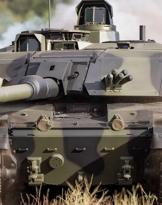Russia, Iran and now China. Putin has formed a new "triple alliance" in Syria with countries historically close to the Kremlin. According to reports from the government of Damascus, a Chinese warship would be on its way to Syria: currently it would be in the Mediterranean. However, this information has been denied by the Israelis. According to the intelligence agency DEBKA, the Chinese have already deployed the Liaoning aircraft carrier and a missile launcher near the Syrian coast.
The Chinese would not yet have an offensive capacity. According to Israeli analysts, in fact, the carrier docked at the port of Tartus lacks its air component. Warplanes will arrive in Syria by mid-November, flying through Iran or transported by Russian cargo.
If so, this explains the need to establish a "military coordination cell" in Baghdad. According to Debka, the Chinese would be setting up a squadron of J-15, fourth-generation multi-role fighters, Z-18F antisom helicopters and Z-18J early warning. Beijing will eventually deploy a thousand soldiers.
Iran, on the other hand, has over a thousand soldiers belonging to the Revolutionary Guard Corps in Syria to assist Hezbollah in Zabadani. Putin from Vladivostok called for the creation of a coalition against the Islamic State: China and Iran responded to the call.
Since 2011, forces loyal to Assad have been fighting against various opposition groups, some of them radical extremists such as the Al-Nusra Front and the Islamic State. Since the start of the war in Syria, the United States has supported the moderate Syrian opposition, demanding Assad's resignation. Russia, on the other hand, recognized Assad as the only legitimate authority of Syria.
Moscow is not just trying to support the Syrian government, but also to expand its role within Syria so that it can influence the choice of a new government in case Assad is overthrown. Moscow, in just a few weeks, has created an advanced defensive perimeter (Tartus, Latakia, Istamo and Al-Sanobar) from where it is possible to project their power in the Region.
The Tartus naval base is the last Russian outpost in the Middle East after the collapse of the Soviet Union. It would be appropriate to consider a given: the Tartus base, on the Mediterranean coast of Syria and connected to the Bassel al-Assad International, airport south of Latakia, is now protected by five Russian warships, three Chinese and at least two submarines. It is impregnable.
The isolation of the West against Russia, following the sanctions imposed after the Ukraine affair, has in a sense authorized Putin to act without any kind of international consensus. Indeed, precisely for the Russians, patriotic rediscovered after the Ukraine affair, Putin was the only one to align with the Syrian regime in the name of the fight against terrorism and extremism.
The United States, on the other hand, would be those who would have facilitated the rise of the Islamic state with the failure of their strategy. In fact, Moscow is not part of the international coalition against ISIS.
One wonders now who could oppose the Russian-Chinese coalition's initiatives. The answer is simple: none.












